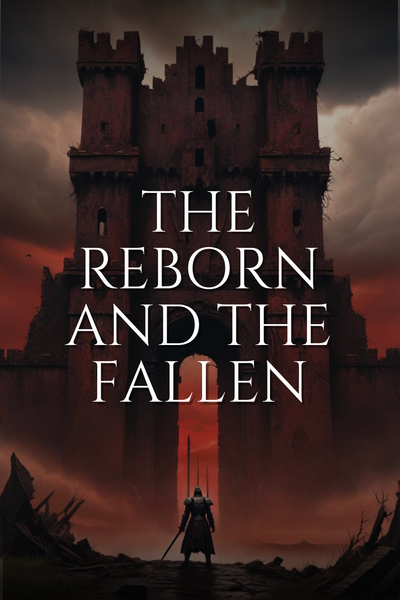The first clash was sudden and violent—a brief, brutal encounter at the edge of the camp, where a patrol of rebels caught one of the groups by surprise. In the ensuing melee, Eryth’s skills shone with terrifying clarity. He moved like a shadow among the rebels, his blade a precise instrument of death. Every strike was executed with cold efficiency; every motion was calculated to minimize chaos and maximize impact. Blood stained the forest floor as the rebels fell, their defiant cries silenced in the grim finality of his assault. In those moments, the battlefield became an arena where his assassin’s instincts intertwined seamlessly with the strategic foresight of a seasoned commander. It was a performance both savage and artful—a tragic dance of violence that left no room for mercy.
Yet, even as the battle raged in fits and bursts, Eryth remained aware of the greater strategy at play. He knew that the true objective was not to eliminate every foe but to disrupt the leadership of the rebellion. Every enemy he struck down was a step toward shattering the insurrection from within. His mind, honed by years of darkness and tempered by the grim promise of redemption, calculated each move with the precision of a master tactician. He was fully aware that the personal cost of this mission would be high—not only in the lives lost on the field of battle but in the toll it would exact on his already tormented soul.
As the initial skirmish subsided into a tense lull, Eryth regrouped with his lieutenants under the cloak of the forest canopy. They moved swiftly through the chaos, their path lit only by the faint glow of a rising sun filtering through the dense foliage. Every moment was a reminder that the rebellion was far from over, that the heart of the insurrection still beat defiantly in the command center hidden within the encampment. The strategic mastermind within him, the general who had once led armies to both glory and ruin, now set his mind to the task of isolating and eliminating the rebel leaders. With a series of terse commands, he organized a diversion, ordering one group to engage the bulk of the rebel forces while another, led by him, infiltrated the inner sanctum of the camp.
In the ensuing hours, the border province became a maelstrom of violence—a chaotic symphony where the sounds of clashing steel and anguished cries wove together in a tapestry of both triumph and tragedy. Eryth’s infiltration unit moved silently through the labyrinthine alleys of tents and fortifications, their passage marked only by the fleeting glint of steel and the whispered sigh of the wind. Within the rebel camp, distrust and fear had already begun to seep into the ranks as the carefully orchestrated diversion sowed confusion. In the darkened corridors of the encampment’s command center, the rebel leaders scrambled to restore order, unaware that their fate had been sealed by the quiet, relentless advance of a man born of ruin.
Deep within that command center, Eryth found himself face to face with the rebel chieftain—a gaunt figure whose eyes burned with the fierce desperation of a man who had nothing left to lose. For a heartbeat, the two locked eyes, and in that moment, the weight of countless lives and the tragedy of a shattered land hung between them. The rebel’s voice, ragged and defiant, spat curses and accusations at the intruder, but Eryth merely regarded him with a grim detachment. Every movement he made was deliberate, every breath measured, as he enacted the plan that had been forged in the crucible of his tortured past. With a swift, precise motion, his blade found its mark, silencing the rebel leader in a final, irrevocable act. It was a moment of stark finality—a brutal punctuation to a long-standing cycle of rebellion and repression.
Yet, even as the rebel command crumbled beneath the relentless pressure of Eryth’s assault, the cost of the battle began to reveal itself. The forest, once a silent witness to the quiet passage of time, was now stained with the blood of both the insurgents and the loyal soldiers of the Demon Lord. Smoke curled upward into the pale sky, carrying with it the acrid scent of burning straw and shattered hopes. Amid the chaos, Eryth felt a profound sense of isolation—a realization that no matter how many enemies he felled, the wounds of his past and the burden of his curse could never be so easily erased. Every life ended in the fray was a stark reminder of the merciless cycle of violence he had once epitomized, and that despite the strategic brilliance he now wielded, the darkness within him still whispered of regret.
As the day wore on and the initial tumult began to subside, the border province lay in a state of grim, uneasy quiet. The rebel forces, now leaderless and disoriented, began to scatter like leaves caught in a dying wind, their dreams of liberation reduced to flickering shadows on blood-soaked ground. Eryth, his mission only partially complete, gathered with his remaining lieutenants on a ridge overlooking the devastated encampment. The view was one of sorrow and stark beauty—the valley below was marred by the scars of battle, yet beneath the carnage lay the potential for renewal, a reminder that even the deepest wounds might one day heal.
In that solitary moment of reflection, Eryth allowed himself to consider the broader implications of the mission. The rebellion had been but one manifestation of a deeper malaise—a corruption that had seeped into the very foundations of the Demon Lord’s realm. The province was a microcosm of a world in decay, where the promise of order was betrayed by the tyranny of a ruler who demanded absolute obedience at the cost of human dignity. As he surveyed the ruined landscape, Eryth’s mind turned inward to the personal trials that had led him to this point—the endless nights haunted by the ghosts of his past, the bitter taste of betrayal, and the quiet, persistent hope for redemption that had driven him to accept a cursed destiny.
Though the battle had been won on the field, the war against the forces that had long oppressed the people was only just beginning. The strategic victory, hard-won and tainted by the blood of innocents, served as a grim precursor to the challenges yet to come. Eryth knew that his own path was fraught with peril, that every step forward would demand sacrifices that might further erode the fragile remnant of humanity still clinging to his soul. And yet, as the early afternoon sun cast long shadows over the ravaged landscape, a quiet determination settled over him—a resolve to use his skills, both as an assassin and as a commander, to reshape not only the fate of a province but perhaps to kindle the flame of redemption within his own tormented heart.
As the assembled warriors began the arduous task of consolidating their gains and tending to the wounded, Eryth moved silently among them, his presence a stark reminder of the duality of his existence. He was the instrument of ruthless efficiency—a blade honed to perfection and a mind as sharp as the edge of his sword—yet he was also a man burdened by the weight of forbidden memories and the lingering hope that he might yet reclaim a part of the honor he had lost. His eyes, dark and inscrutable, roamed over the faces of those around him, each one a story of hardship and quiet defiance. In their silent gratitude and steely resolve, he saw reflections of his own inner conflict—a mirror in which the tragedy of his past and the possibility of a redeemed future were inextricably intertwined.
In the hours that followed, as dusk began to settle over the bloodstained plains of the border province, Eryth and his contingent set about fortifying their position. The rebels, though dispersed and leaderless, were far from vanquished; their bitterness would eventually coalesce into a renewed resistance, and the struggle for the soul of the realm was far from over. With the skill of a seasoned strategist, Eryth orchestrated a series of defensive measures designed to repel any further incursion. Trenches were dug, barricades raised, and watchtowers erected along the perimeter of the reclaimed territory. Every order he issued was imbued with the gravity of one who had seen both the heights of triumph and the depths of despair—and every command was a silent vow that he would see his mission through, no matter the cost.
Yet even as the practical demands of military duty took precedence, Eryth could not entirely escape the inner tumult that had long defined his existence. In quiet moments beneath the vast, bruised sky, he would find himself alone with his thoughts, reliving the scenes of battle and the echoes of those long-forbidden memories that had shaped him. The fierce clash of steel and the cries of the dying merged with the gentle, haunting recollections of a love that had once blossomed in secret—the tender touches, the forbidden glances, the brief moments when the world had seemed to hold its breath in awe of the depth of their unspoken passion. These memories, vivid and bittersweet, were as much a part of him as the blood on his hands, and they served as both a comfort and a torment, a reminder that even amidst the chaos of war there existed a fragment of beauty that refused to be extinguished.











Comments (0)
See all